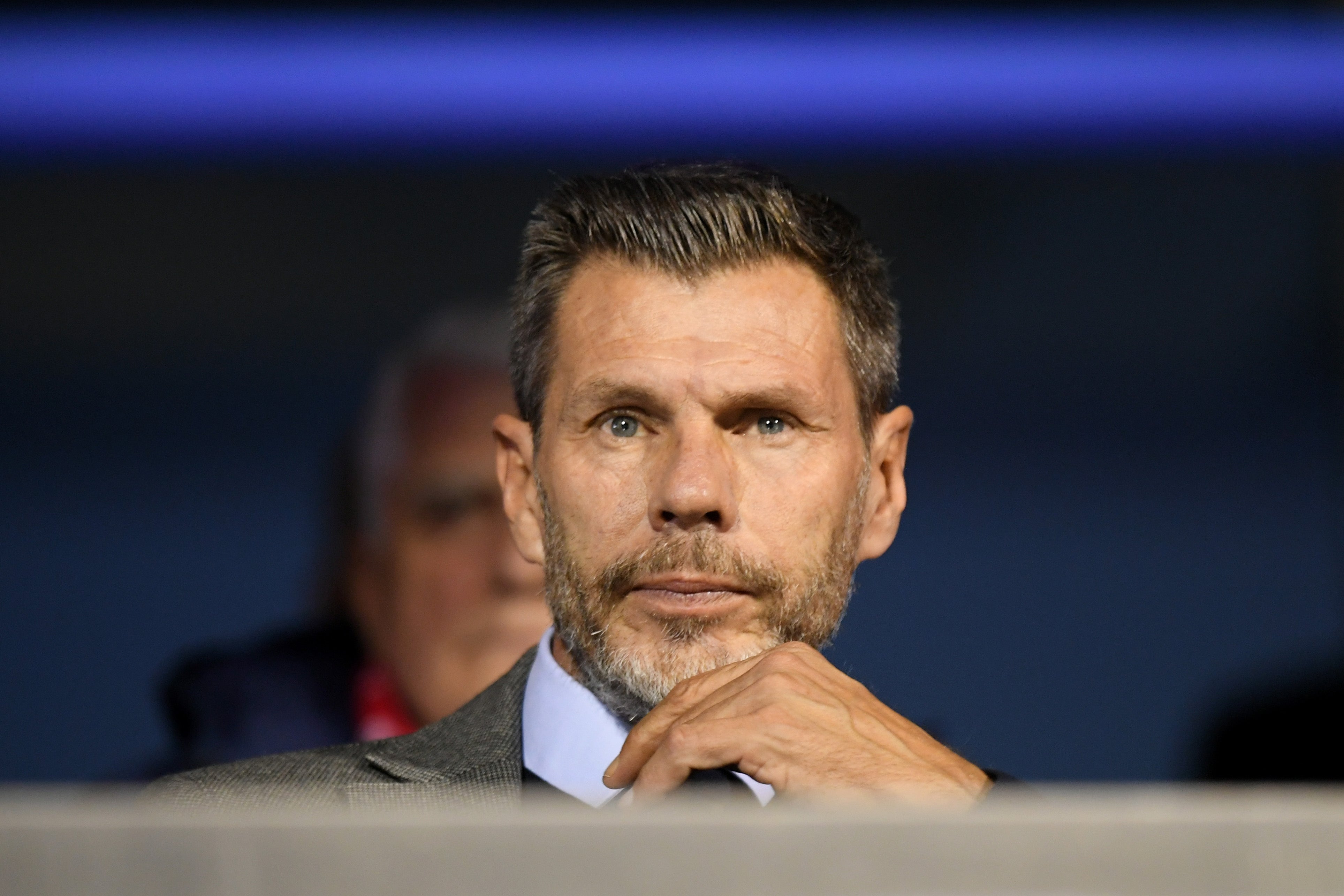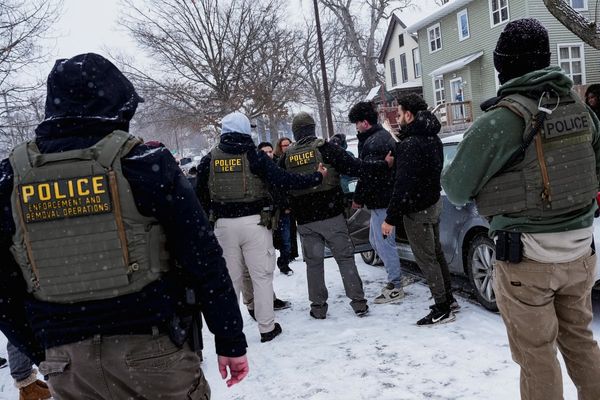It’s a question being asked of the Uefa president in a lot of stadium executive boxes this summer. “Where is Aleksander Ceferin?”
It’s also a question that works in a few ways. It could refer to the fact Ceferin has so far attended only one match at Uefa’s own Women’s Euro 2025. It could refer to how he attended matches at neither the Under-21 Euros or the Club World Cup. Or, perhaps most importantly, it could refer to Uefa’s lack of response to the football land grab that Fifa’s controversial new competition represented.
The Fifa president, Gianni Infantino, is seen as having outflanked Ceferin. Even the Uefa walkout at May’s Fifa Congress in Paraguay, when Infantino turned up late, ended with a bizarre climbdown five days later.
These are certainly bizarre times for football. It’s debatable whether the Club World Cup fully worked as an event, but it undeniably worked for Infantino’s purposes. Donald Trump’s farcical appearance at the trophy presentation essentially crowned a landmark moment for the Fifa president, that will now embolden Infantino in trying to supplant the Champions League as the premier club competition. Many club executives already see it as the Super League they didn’t get in April 2021, but with institutional endorsement.
That’s maybe the most significant shift in all of this. The big clubs used to loathe Fifa as an embarrassing nuisance. Now, they’re essentially in business with them. The European Club Association has deepened its relationship with Infantino, having long been close to Ceferin.
The grounds for upheaval are all there. And although many of the criticisms that can be levelled at Infantino can also be levelled at Ceferin, given the unique nature of these executive president roles, it does seem strange that the other most powerful football body lacks presence in all of this. It’s all the more strange since there’s a known “cold war” between Uefa and Fifa, and there’s literally a major tournament happening in the country where Uefa are based.
Ceferin is said to be confident he has an agreement that Fifa will only hold the Club World Cup every four years. That sounds a bit like his trust in Andrea Agnelli before the Super League. Many football sources see it as shockingly naive, especially with how clubs are already talking about a tournament every two years and expansion to 48 teams.
Uefa could even be criticised for being in denial, but – as one prominent Uefa source sighs – “we seem to be in denial about so much”.
Then again, that’s an inevitable consequence of surrounding yourself with “yes men”. Numerous sources insist that, after eight years in the job, Ceferin doesn’t really react well to views he doesn’t want to hear. As one insider says, “you’re not allowed to express a different opinion to that of the president, and you can’t even try to offer advice”.
That seems to have fostered a detachment, that has manifested in a lack of presence at games. It’s also connected to classic football politics. Football’s clientelistic systems have always seen loyalty rewarded with appointments and influence that elevate status back home, especially in the guise of major events.
It all points to a crucial reason that presidents are supposed to have term limits, which has already been a controversy in Ceferin’s presidency.
As it is, Ceferin is surrounded by at least eight loyalists, potentially rising to 12 or 13. Directly under him is Serbia’s Zoran Lakovic, who is generally seen as executing the president’s plans. There is then Italy’s Gabriele Gravina, who is said to have earned Ceferin’s respect for leaning towards him over Infantino, and is now Uefa senior vice-president.
Two come from Germany: Bernd Neuendorf, the DFB president who is on the Fifa council; Hanz-Joachim Watzke, the former Borussia Dortmund chief executive who is now on the Uefa Executive Committee.
Albania’s Armand Duka has so grown in influence that he is said to harbour ambitions to succeed Ceferin, but he may have to wait, since Denmark’s Jesper Moller pushed for statute changes that could yet allow Ceferin another term after 2027. Another Uefa vice-president, Moller is understood to have committed a tactical mishap when he voted in favour of the unpopular motion to return Russian youth teams.
Estonia’s Aivar Pohlak is viewed as a “loyal soldier” despite being less vocal about football ideas, but isn’t as close to Ceferin as Hungarian billionaire Sandor Csyani, who is also on the Fifa Council.
The loyalist raising the most intrigue is Turkey’s Ibrahim Haciosmanoglu, since his country’s federation is seen as very close to Qatar and ECA chairman Nasser Al-Khelaifi, with Uefa also having raised eyebrows with the opening of an office in Istanbul.
Also in Istanbul over this period: the 2023 Champions League final, moved from 2020 and 2021; the 2026 Europa League final, and Euro 2032, as part of a joint bid with Italy. More critical voices within Uefa have of course tracked the staging of major events. Italy has won hosting rights to Euro 2032 despite huge questions about staging and infrastructure. Albania has had the 2025 Under-17 Euros and the 2022 Europa Conference League final. Hungary gets the 2026 Champions League final. Germany has meanwhile had even more than Turkey, including Euro 2024, the 2025 Champions League final, the 2025 Nations League finals and the 2027 Europa League final. The one outlier is Wembley, still regularly hosting major matches despite the Football Association having earned the ire of Uefa leadership for being the one federation to vote against the statute reforms potentially allowing Ceferin to stand again. It just so happens that Wembley is Uefa’s most commercially lucrative host, so they love it.
Former Uefa treasurer David Gill, who repeatedly argued back against Ceferin, is still one of many respected figures to be cast aside. That group includes Croatian legend Zvonimar Boban and former depity general secretary Kevin Lamour, who has now decamped to Fifa.

Other figures seen as more concerned with the direction of the sport are growing frustrated. General secretary Giorgio Marchetti, famous for helming the Champions League draw, has at least been a tireless presence at Euro 2025 matches as a genuine lover of the sport.
Many have been surprised by the trajectory of Razvan Burleanu’s positions. The Romanian was seen as a potential challenger to Ceferin, but in Paraguay was the executive who rallied Uefa representatives for the walkout. Sources point to the fact that Bucharest was rejected for the 2026 Europa League final in favour of Istanbul.
There are even more questions about what exactly happened after Paraguay. Many in football lament a great lost opportunity, especially since Uefa seemed to capture the prevailing mood at that moment by so pointedly criticising Infantino’s “private political interests” in an excoriating statement.
With various European politicians acutely interested in football’s questionable direction, Uefa could have got them onside for the beginning of a groundswell. Instead, Uefa withdrew and referred to the episode as “isolated”, while hailing “the strong and respectful relationship with Fifa, built on mutual trust”.
Nobody believes this. Some Uefa sources insist they just didn’t want a full-blown war. Others wonder whether the big clubs intervened, especially with the Club World Cup about to start. This is the new world that Ceferin and Uefa have to face up to. They don’t currently have much of a presence, let alone a strategy.
Liverpool transfer news: Isak, Ekitike, Mateta and more
Newcastle insist Alexander Isak not for sale amid Liverpool interest in star man
Cole Palmer is England’s cheat code for World Cup success after Chelsea heroics
Arsenal transfer news: Gyokeres, Madueke, Eze and more
Morgan Gibbs-White transfer to Tottenham stalls as midfielder trains with Forest
Kolo Toure joins Manchester City’s backroom staff on permanent basis







